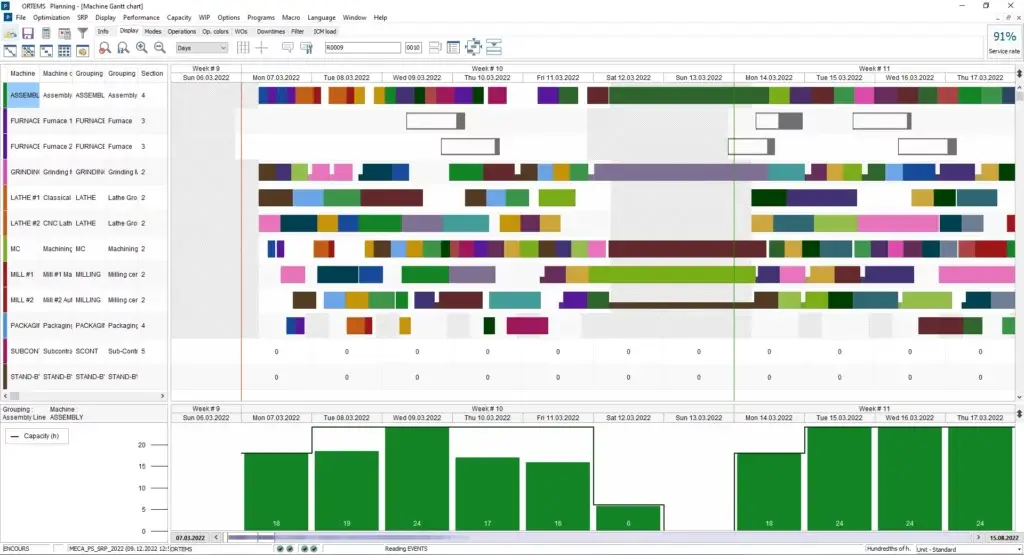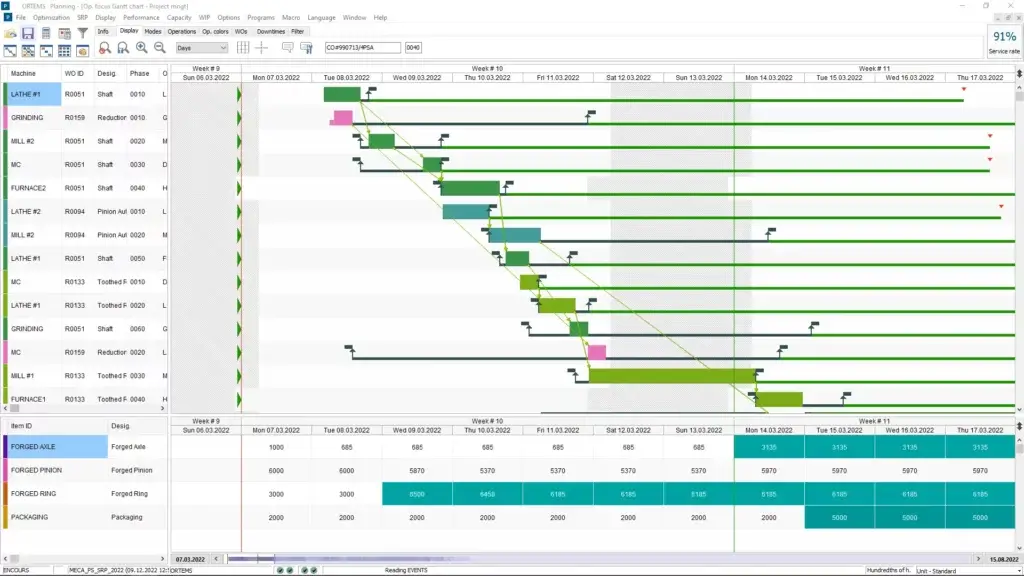Manufacturing Production Scheduling Software
Production Scheduler
The Production Scheduler (PS) is a crucial component of the DELMIA Ortems’ APS system, designed to streamline and optimize the production scheduling process. This software employs a powerful algorithm that considers various constraints related to production resources, including machine availability and usage, employee skills and expertise, product specifications, and internal logistics, allowing manufacturers to optimize production.
One of the key benefits of the Manufacturing planning system (PS) is its ability to adapt to changes in the production environment. With the production scheduling software, Manufacturers can easily modify any aspect of the production schedule, ensuring that their operations remain flexible and responsive to market demands. The software allows for manual adjustments, enabling manufacturers to fine-tune their production scheduling as needed.
Moreover, Manufacturing scheduling software (Production Scheduler) facilitates the collection and processing of production data related to manufacturing demand, production processes, and inventory management . This enables manufacturers to make informed decisions about their production schedules, ensuring that they meet customer demands while optimizing the use of their resources.
With the Production Scheduler, manufacturers can achieve greater efficiency and productivity in their operations. The software solution automates the process of creating production schedules, freeing up time and resources for other areas of the business. This results in a reduction in lead times, improved product quality, and increased customer satisfaction rates.
In addition to its efficiency and adaptability, manufacturing production planning software (Production Scheduler) also offers advanced features for collaboration and communication within manufacturing organizations. The scheduling tool provides a centralized platform for managing production schedules and resources, enabling different teams within the organization to work together more effectively. This team-oriented production scheduling can help to reduce the risk of miscommunications or delays, allowing you to minimize production time.
Overall, Manufacturing scheduling software (Production Scheduler) is a critical tool for manufacturers looking to improve and optimize their production processes. By leveraging the production scheduling software‘s powerful optimization algorithm and advanced scheduling software features, manufacturers can streamline manufacturing production planning, easily modify their schedules, and reduce limitations like equipment availability and utilization, operators’ knowledge and skills, characteristic of the produced goods, and internal logistics.
Maximize Efficiency & Output with Powerful Production Scheduling
The Production Scheduler (PS) allows for efficient production scheduling by facilitating and expediting the creation of short-term production schedules. With this software, you can quickly generate accurate schedules, taking into account a range of variables, such as machine and employee availability, changeover times, and more. By leveraging the power of the Production Scheduler, you can make informed decisions and optimize manufacturing production.

Organize Tasks on a User-Friendly Visual Production Display
With this production scheduling application, you can easily manage orders by arranging operations shown as colored tiles on a timeline within the graphical interface of the tool. The scheduling software enables the tiles to be moved, dragged, and dropped to model the schedule according to your preferences.
Crucially, production operations can be interdependent. Therefore, when you modify one task, all other related tasks will automatically adjust, optimizing the production plan and schedule.
Unforeseen Machine Downtime? Employee Absences?
With the Production Scheduler, you can mitigate the impact of unexpected events during production. Whether you prefer to manually manage delayed operations and relocate them to different machines or let the system automatically rebuild the schedule, this tool’s production scheduling capability has you covered.
The optimization engine of the Production Scheduler automatically allocates delayed orders in a way that maximizes production efficiency while considering critical variables such as available machines, changeover times, and even customer priorities.

Adjust the Production Schedule in Real Time
The Production Scheduler empowers you to swiftly adapt to fluctuating production conditions while taking into account employee expertise, product requirements, and internal logistics. This dynamic tool allows you to oversee and manage all variables in real-time, ensuring your schedule remains current and aligned with the ever-changing demands of the manufacturing environment. By delivering achievable production schedules and facilitating seamless adjustments, the Production Scheduler drives productivity, minimizes downtime, and ultimately enhances your overall operational performance.
Ready to get started?
Contact us and we’ll get in touch.
Align Your Manufacturing Production Scheduling with Company Priorities
Production Scheduler empowers planners to align their decisions with the company’s production strategy. This production scheduling solution enables the analysis of the current production and simulations, modeling manufacturing production for comparison.
Directly on the shop floor, planner can easily choose the best scheduling strategy for the current production needs of the company, minimizing changeover times in production, and prioritizing orders for specific clients.
With Delmia Ortems Production Scheduler...
- Create and optimize a short-term production plan (days, hours)
- Adjust the schedule according to changes in the factory
- Choose criteria for creating the schedule (reducing changeover times, maximizing machine utilization, etc.)
- Create a schedule for individual products and operations
- Optimize the production schedule, keeping in mind resource constraints
Production Scheduler
Synchronized Requirements Planner
Frequently asked questions
Yes, you can use the Visual Interface Configurator module to integrate DELMIA Ortems with any ERP system.
Yes, the DELMIA Ortems interface enables you to make updates and adjustments to the timeline of orders and production operations, as well as set units of time, e.g., minutes, days, weeks, or months. The system allows for full customization of order information: order details, descriptions, numbers, and other info can be easily changed.
Yes, the system provides the reporting capability that allows for exporting reports in such formats as PDF. The second reporting method involves exporting reports directly from the system’s database into Excel spreadsheets or other data analysis tools.
No, DELMIA Ortems is an APS system that facilitates the creation of automated, optimal, and realistic production plans. Production reporting happens through MES and ERP systems that send information of completed operations and orders to APS.
Information about a production completion is typically sent from an MES system (or another production monitoring tool) to ERP, and then to an APS system.
An advanced planning and scheduling (APS) system extends capabilities of an ERP system and allows for preforming complex planning operations and optimized simulations, facilitating a streamlined process of developing production schedules for multiple products, leveraging diverse processes used across the company while taking into account limited production resources.
A customer service level (CSL) is a measure of customer satisfaction due meeting customer needs and expectations of product quality, delivery time, reliability, and convenience.
Demand planning is a complex and multilayered process that helps estimate the market demand and sales operations to organize production processes and create budget plans allowing for meeting customer demand, all while minimizing overstock and supply chain disruptions.
Electronic work instructions (EWI) are tools such as videos, images, 3D modeling and simulation software that provide working instructions and task guidelines for shop-floor operators.
An enterprise resource planning (ERP) system allows for management of a company’s resources such as staff, stock, and finances to optimize the use of these resources as well as the operations and processes taking place across the enterprise.
Production forecasting is the process of estimating the production size (including demand, sales, and the need of resources or new products) based on research and analysis of the available relevant data.
Product genealogy is a manufacturing execution system’s (MES) capability that enables monitoring of production lots by tracking finished goods from raw materials to completed products, from suppliers to end users. Monitoring production processes and tracking product genealogy are currently among the standard elements of production control, ensuring customer safety.
Lean manufacturing is an approach to manufacturing operations management based on the principle of minimizing the use of all resources, including time, while delivering goods and services of the highest quality at the lowest possible production cost.
Labor is the human effort that contributes to manufacturing operations and production processes.
A manufacturing execution system (MES) is a system used in manufacturing operations for tracking and documenting turning raw materials into finished products, enabling an effective, real-time data collection and control of multiple elements of the production process, including stock, personnel, machinery, and support services.
Manufacturing operations management (MOM) encompasses standard MES functionalities, e.g., managing staff, resources, and stock, while allowing for management of the whole enterprise, i.e., control of warehouses, shipments, material quality and maintenance.
Product lifecycle management (PLM) is the process of managing the whole product lifecycle from ideation, through research and development, service, all the way to disposal. Typically, the process allows for keeping the latest documentation with all its previous changes.
A visual interface configurator (VIC) is a solution that enables DELMIA Ortems to integrate with external data sources like files, databases, and other computer systems. The tool’s proven-to-work technology facilitates an easy communication with external systems with no need for coding or programming. The VIC module enables connections with other systems like ERP and MES.

Thousands of companies from various manufacturing industries are already using the APS Production Scheduler. Reach out if you’re interested in learning more about this tool and the benefits it can bring to your company.
Ewa Prokulewicz
Business Development Manager
- eprokulewicz@andea.com
- +48 536 590 357
